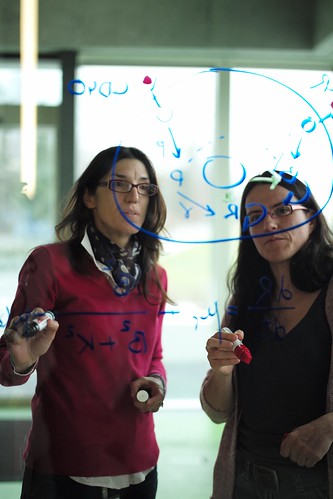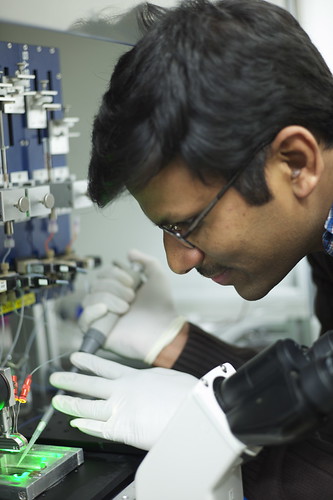 |
Maria Gabrani (l) and Maria Rodriguez
Martinez tackle cancer with Big Data |
|
Recently, SystemsX.ch, the Swiss initiative in systems biology, announced that IBM Research - Zurich was accepted as a new partner organization within its framework - a significant achievement making it easier for IBM scientists to collaborate with the greater Swiss biological research community.
Led by IBM Fellow Alessandro Curioni, we recently spoke with Maria Gabrani and Maria Rodriguez Martinez, two of the systems biology scientists in Zurich. The two are already involved in a number of SystemsX.ch projects.
Why is it important for IBM Research to be part of SystemsX.ch?
Maria Rodriguez Martinez: Within the SystemsX.ch we are given an ideal framework for collaborating with a number extremely high-caliber institutes across Switzerland, like ETH Zurich, University of Zurich, University Bern and the University Hospital Zurich. Previously, to participate we had to partner with a member organization, which worked, but being able to directly participate in calls is much more productive.
In addition, SystemX.ch and the projects it funds are multi-disciplinary, which is ideally suited to our lab in Zurich since our science covers everything from atoms to analytics.
Maria Gabrani: Unlike similar organizations SystemX.ch really enforces collaboration across different disciplines, which makes us as scientists think more broadly on how to solve a particular challenge. Maria and I are a good example of this. While I focus on image processing and pattern recognition techniques, she focuses on quantitative models to study molecular patterns in biology, including cancerous cells.
SystemX.ch also has a strong pulse on global trends and it scales consistency across Switzerland, so most of the organisations are focused on the same direction, which obviously should reflect positively on a faster outcome.
 |
| Govind Kaigala and the microfluidic probe |
What are some of the SystemX.ch projects at IBM?
MRM: There are several. One on-going project is led by my colleague Govind Kaigala who is collaborating with pathologists at the University Hospital Zürich to test a new prototype tool to accurately diagnose different types of cancer. This work is based on a technology developed by IBM scientists called a microfluidic probe, which is a microfabricated device to precisely shape, present and handle nanoliter volumes of liquids on biological surfaces.
Within our group, we have a PhD student starting in a few weeks who will work with Maria and me on another collaboration with the University Hospital Zürich specifically focused on prostate cancer.
More specifically, we will analyze the genomic data of 40 patients who have been extensively profiled at the molecular level. We have information about their DNA, genes, mRNAs and proteins. The challenge is all the data, most of which is not informative, so the less relevant data needs to be removed, while still keeping the models accurate. It’s a lot harder than it sounds.
Another project that will start in April 2015, focuses on breast cancer. One of the challenges here is that cancer is a heterogenous disease, meaning that many different types of cancer cells coexist in a tumor. When you sequence or measure single cells you get a random mixture of these cell populations, which makes hard to understand the molecular alterations that characterize each population. Also, since there isn’t one particular type of cancer cell, it is difficult to treat with a single drug.
In this project, we will generate single cell data, including the RNA and protein molecules, from the breast cancer. Then we will analyze both and attempt to reconstruct the structure of the cell populations. The final goal is to develop a statical model that identifies which population of cells has the most-relevant characteristics which need to be targeted with treatment.
Another project, with IBM scientist Jasmina Bogojeska, is focused on the human immunodeficiency virus, commonly known as HIV. After turning a deadly infection into a chronic, life-long treatable disease by cocktails of antiretroviral drugs, focus has shifted towards the ultimate goal in the combat against HIV-1: The elimination of the virus from its host.The SystemX.ch project has the ambitious goal of defining the major host and viral factors that play a role in the pathomechanisms of HIV-1 latency.
MG: Systems biology is a quintessential Big Data problem. The data is sparse and undetermined. We have developed novel techniques which enable us to detect the most relevant patterns that can describe the full set. These techniques haven’t been applied yet in this area. It will need to be explored as part of the project with the goal of finding the patterns which are most informative for the molecular phenotypes at hand, enabling the deciphering and the observation of the heterogeneity. The result is that we can do more agnostic analysis and in that respect more optimal treatment recommendations for patients, individually.
How does your research fit in with other IBM projects like Medical Sieve?
MG: Yes, Medical Sieve, which is being developed with colleagues in our Almaden, Haifa and the Australia lab, is an image-guided informatics system that acts as a filter to sort the essential clinical information physicians need to know about the patient for diagnosis and treatment planning.
The primary focus of Medical Sieve is in analyzing the radiology type of images, such as CT and MRI. Under the context of systems biology, we focus on digital pathology and gene expression imaging, which is different. We want to model the changes the cells undergo during pathogenesis for better disease stratification and, by integrating our models with the omic work from Maria, for predicting disease progression. In the discussions I have had with the Medical Sieve team they see our work as an additional input for the imaging technology to make the cognitive system even broader.
We can also potentially extend our method to the cytology-based prototype cancer diagnosis tool that Govind is currently developing for his SystemX.ch project.Labels: computational biology, IBM Research - Zurich, SystemsX


